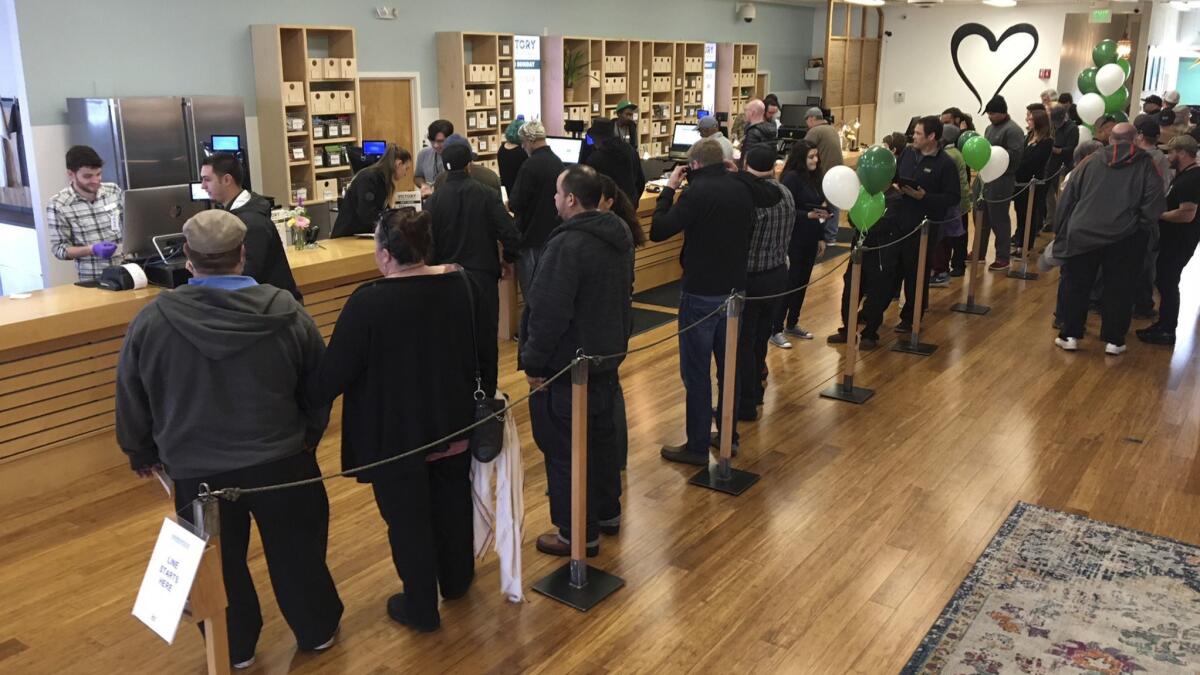Editorial: California’s pot shops have been only open a year. They’re already lobbying for a tax cut

More than two years after California voters passed Proposition 64 to legalize marijuana, the state’s attempt to create an orderly, regulated marijuana marketplace is still a work in progress.
There are far fewer licensed cannabis businesses than had been expected and tax revenue — which officials had estimated could reach $1 billion — is trickling in at a fraction of what was anticipated. The black market for marijuana is still thriving.
Now, several lawmakers and State Treasurer Fiona Ma have introduced Assembly Bill 286, which would temporarily slash cannabis taxes in an effort to entice illegal marijuana businesses to enter the legal market. Industry groups have been lobbying for this break, arguing that lowering taxes would also bring down the price of regulated marijuana, helping legitimate operators to compete with black market dealers.
Cannabis is no ordinary business, and cannabis taxes have a broader purpose than most other taxes.
“We are helping legal cannabis businesses with their transition into the marketplace, just like we would for any startup industry,” Ma said in a statement.
But cannabis is no ordinary business, and cannabis taxes have a broader purpose than most other taxes.
In fact, the architects of legalization, including a Blue Ribbon Commission on Marijuana Policy created in 2013 by then-Lt. Gov. Gavin Newsom, thought long and hard about how to set the tax structure for the new industry. Prices should be low enough to compete with the black market but high enough to deter heavy usage and use by minors, the commission recommended.
Proposition 64 set the tax rates. However, the initiative also directed the Legislative Analyst’s Office to report to lawmakers by January 2020 on recommendations to adjust the tax rates to undercut the illicit market and discourage underage use while still providing enough money for regulation, law enforcement, research and other programs funded by cannabis tax revenue.
The LAO has already begun that report. There may be good reasons to adjust the tax structure, either temporarily or permanently. Colorado lawmakers raised cannabis taxes a few years after legalization. Washington overhauled its system so that instead of having three taxes collected at various points in the supply chain, there was only a single tax at the retail shop. Shouldn’t California lawmakers wait for a thorough analysis before they start cutting taxes?
Cannabis industry groups argue that businesses can’t wait. Legitimate operators, they say, invested enormous amounts of money to get licensed and to comply with the state’s complex regulations, but they’re being undercut by illegal pot shops and delivery businesses. That’s a real problem. The state needs much more aggressive enforcement to shut down illicit operators.
Enter the Fray: First takes on the news of the minute »
But high taxes aren’t the only reason the black market persists. Proposition 64 allowed localities to ban cannabis businesses and many have done so. Fewer than 20% of California cities allow retail shops to sell marijuana for recreational use. No matter if a pot business has been operating for years in the gray market that existed prior to regulations, the business can’t become a legitimate, taxpaying entity without local approval. Even in the cities that do allow marijuana businesses, many are still struggling to license in a timely fashion.
No wonder the black market is flourishing.
AB 286 would cut the state cannabis excise tax from 15% to 11% and suspend the cultivation tax of $9.25 per ounce of cannabis flower. Both would be temporary reductions that would end in June 2022. It would not affect local marijuana taxes, which can run from 5% to 15%. Nor would the bill stop localities from raising their taxes even more if lawmakers lower the state tax rates. That would divert revenue from marijuana-related programs laid out in Proposition 64 into local coffers while undercutting the whole purpose of AB 286.
It’s worth remembering that legal recreational sales only started last year in January. It’s not surprising that California is experiencing the growing pains as it transforms the marijuana industry from a largely uncontrolled, unchecked and underground operation into a highly regulated, taxpaying marketplace. (Marijuana remains illegal under federal law.)
This was never going to be an easy process. Lawmakers ought to slow down, wait for the LAO’s recommendations and then think about whether marijuana taxes are helping or hurting California.
Follow the Opinion section on Twitter @latimesopinion and Facebook
More to Read
A cure for the common opinion
Get thought-provoking perspectives with our weekly newsletter.
You may occasionally receive promotional content from the Los Angeles Times.






